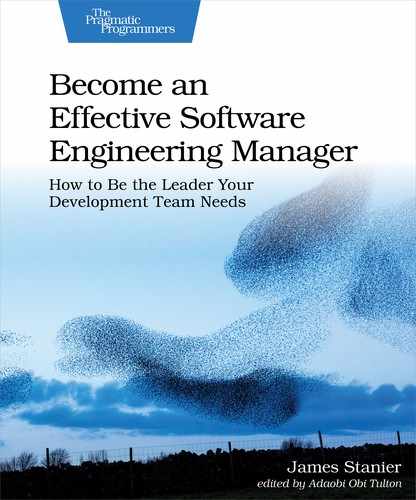Life can only be understood backwards; but it must be lived forwards.
Chapter
6
The Most Wonderful Time of the Year
What’s that familiar feeling of worry as you check your calendar for the next few weeks? Ah yes, that’s right: it’s review time. You remember your first performance review at your previous company. Those butterflies in your stomach as you stood outside of your manager’s office. The look of dread on the face of your colleagues as they exited the room. Your sweaty palm as it touched the cold door handle. It was awful. Entering the room, you sat down in the chair in silence while you waited for your boss to speak.
“So,” he said in an inquiring tone. “How do you think you’ve done this year?”
“Erm, pretty well, I guess.”
“Interesting,” he replied. A long pause followed. It hung in the air.
It was probably one of the most uncomfortable hours of your working life. It felt like an interrogation. You had your view of the last six months extracted out of you by an individual playing both good cop and bad cop simultaneously. You ran through the main features that you worked on. You thought they all went pretty well, but all he did was find holes to pick in them. You talked through some of the areas in which you could have done better. There was no comment. At the end of the meeting you had no idea whether you’d done well or not.
“Oh, and one more thing: 3% increase this year. It’ll be in your January pay.”
You catch yourself daydreaming and bring yourself back into the present moment. You look at your calendar and realize that it’s not just one review you need to sit through this time around. It’s seven. And you’re the manager. Oh dear. Do you really have to adopt that horrible persona and drag your staff (and yourself) through hour after hellish hour? Surely there has to be a better way…

Well, there is. Performance reviews need not be painful. When done well, reviews can be reflective, full of praise and constructive criticism, and act as a springboard for the future. They can further strengthen the relationship between you and your staff. As a manager, you’re on the other side of the table, so you have the opportunity to deliver valuable sessions for your staff. And it just so happens that you’re in luck, because that’s exactly what this chapter is going to be about. We’re going to give you everything that you need to know about giving great performance reviews, from preparation to the meeting to what happens afterward.
It can be challenging to be in the manager’s seat for the first time. But you should see this as an opportunity to be the manager that doesn’t fill their staff with dread when it’s review time. The good news is with some knowledge and careful preparation, you can become a master at doing performance reviews. With time, you may even look forward to doing them, since they’re an opportunity for a deep conversation about personal development and goals.
But let’s get one thing straight: very few people like performance reviews. They’re essential yet often unpleasant—a trip to the proverbial dentist. Yet, despite the unpleasantness, they’re the best opportunity that you have to push your top performers further and course-correct those that are underperforming. Use them well, and your staff will only get better. Use them badly, and you’ll be in for some very awkward conversations.
Here’s what we’re going to cover in this chapter:
-
Myth busting. First off, we’re going to break some common misconceptions and myths about performance reviews.
-
Preparation. We’re going to break down everything that you need to do before the meetings into easily implementable chunks. Since you’ll be managing lots of documents and emails in the lead up, we’ll give you a simple tracker system to keep on top of everything that’s in flight.
-
The written review. We’ll explore how the written review should be structured, including how much you and your staff should write. You can use the template in this chapter for your own reviews if you wish.
-
Peer feedback. Getting a broad selection of opinions from others is just as valuable (and sometimes more valuable) than the feedback that you give your staff yourself. We’ll look at how to collect it and you’ll get an email template to use.
-
What to do on the day. Then we’ll cover the meeting itself, making sure that both you and your staff get what you need from the conversation.
-
Money. This part of the review is often handled badly. We’ll show you how to cover this tricky part of the conversation so that it lands well for both you and your staff.
So, are you ready? You’ll realize that reviews aren’t that bad after all. Let’s get started.
